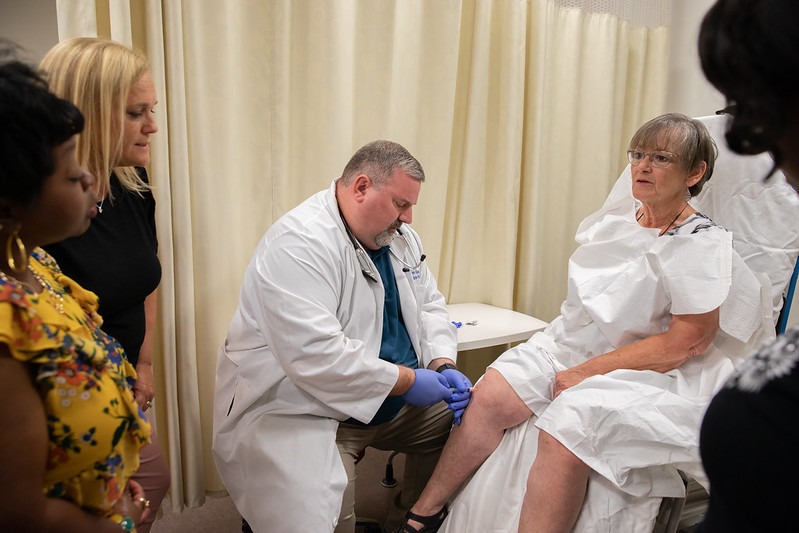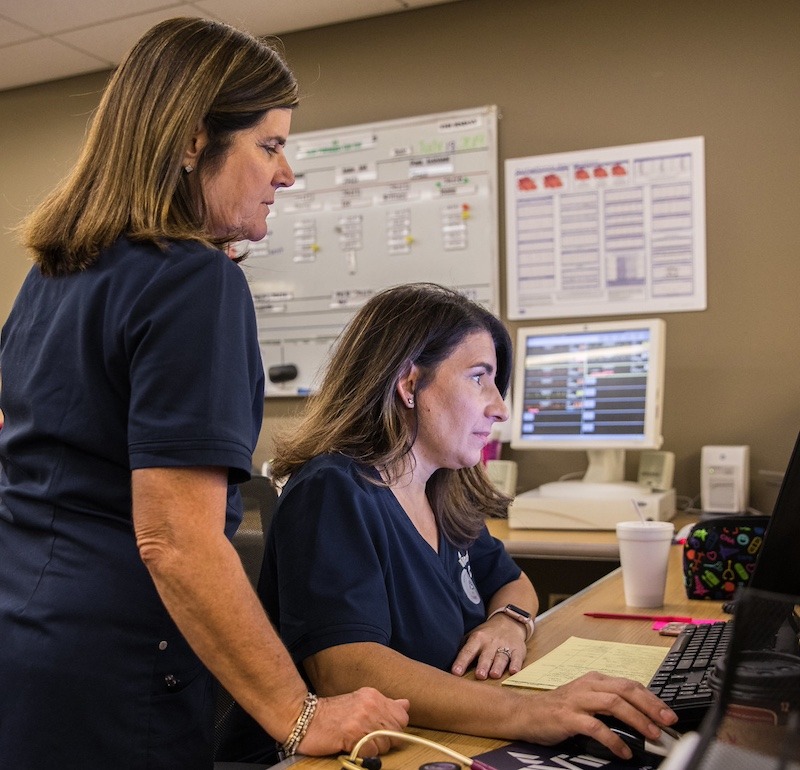Earn Your Geriatric Nurse Degree Online and Step into a Rewarding Career
As the population ages, the demand for skilled geriatric nurses continues to rise, making this a gratifying and essential career path. Geriatric nurses specialize in the care of older adults, addressing their unique health needs and improving their quality of life. If you’re passionate about making a difference in the lives of seniors, understanding how to become a geriatric nurse is your first step.
This comprehensive guide will explore the fundamentals of geriatric nursing, including educational requirements, necessary skills, and the various job opportunities available. Whether you’re just starting your nursing journey or looking to specialize, this article will provide you with the information you need to succeed in this fulfilling field.
Earn your MSN Adult Gerontology Acute Care Nurse Practitioner (AGACNP) 100% online from Rowan University to achieve this professional goal. The program provides registered nurses (RN) with the skills to assume leadership roles in their respective organizations. Our nurse practitioner (NP) program prepares RNs to sit for the concentration certification exam. The certifying agency determines eligibility for the exam.

What Is Geriatric Nursing?
Geriatric nursing is a specialized field of nursing that focuses on the care of older adults, addressing their unique health needs and challenges. This branch of nursing encompasses a broad scope, including the prevention, diagnosis, and treatment of age-related conditions, as well as the promotion of overall wellness in the elderly population. Geriatric nurses are trained to understand the complexities of aging, which often involves managing multiple chronic illnesses and medications, ensuring that patients receive comprehensive and personalized care.
The importance of geriatric care in healthcare cannot be overstated. As the population ages, the demand for skilled professionals who can provide effective and empathetic care to seniors continues to grow. Geriatric nurses play a crucial role in enhancing the quality of life for older adults, advocating for their needs, and educating families about age-related health issues. By focusing on prevention and health promotion, these nurses help to reduce hospitalizations and improve health outcomes, making them vital members of the healthcare team.
Key responsibilities of geriatric nurses include conducting thorough assessments of patients’ physical and mental health, developing and implementing individualized care plans, and coordinating with other healthcare professionals to ensure comprehensive treatment. They also provide education and support to patients and their families, helping them navigate the complexities of aging and healthcare systems. Through their expertise and compassionate care, geriatric nurses significantly contribute to the well-being of older adults and the healthcare community as a whole.
Educational Requirements for Geriatric Nurses
To embark on a rewarding career as a geriatric registered nurse, aspiring professionals must meet specific educational requirements that lay the foundation for their nursing practice. The journey typically begins with obtaining a Bachelor of Science in Nursing (BSN), or an Associate Degree in Nursing (ADN). While both pathways can lead to licensure as a Registered Nurse (RN), a BSN is increasingly preferred by employers and offers a more comprehensive understanding of nursing principles, particularly in geriatrics.
With an increased need for even more highly skilled nurses, a Master of Science in Nursing (MSN) Adult Gerontology Acute Care Nurse Practitioner is rising in demand across the industry.
Once the necessary degree is achieved, candidates must pass the National Council Licensure Examination for Registered Nurses (NCLEX-RN) to secure their nursing license. It is crucial to choose nursing programs that are accredited by recognized bodies such as the Commission on Collegiate Nursing Education (CCNE) or the Accreditation Commission for Education in Nursing (ACEN), as this ensures a quality education that meets the standards required for licensure.
After becoming licensed, continuing education is vital for geriatric nurses to stay updated on best practices and advancements in elder care. Many states require a certain number of continuing education hours to maintain licensure. Additionally, pursuing specialization opportunities, such as obtaining a certification in geriatric nursing through the American Nurses Credentialing Center (ANCC), can enhance a nurse’s expertise and career prospects, setting them apart in a competitive field. By following these educational pathways, aspiring geriatric nurses can ensure they are well-prepared to provide high-quality care to the aging population.

Once You Become a Geriatric Nurse
Once you are a licensed geriatric registered nurse, gaining relevant clinical experience is essential. Seek out positions in settings that provide care for older adults, such as nursing homes, assisted living facilities, or hospitals with geriatric departments. Working in these environments not only enhances your understanding of the specific needs of elderly patients but also helps you develop essential skills in communication, empathy, and care management tailored to this population.
After acquiring hands-on experience, consider pursuing certification options specific to geriatric nursing. The American Nurses Credentialing Center (ANCC) offers a Gerontological Nursing Certification, which can further validate your expertise in this field. This certification not only enhances your resume but also demonstrates your commitment to providing high-quality care to older adults. By following these steps, you can embark on a fulfilling career as a geriatric nurse, making a positive impact on the lives of many.
When considering how long does it take to become a geriatric nurse, the timeline can vary. Typically, obtaining an ADN takes about two years, while a BSN can take four years. After that, passing the NCLEX-RN and gaining clinical experience can take an additional one to two years. Rowan University’s MSN Adult Gerontology Acute Care Nurse Practitioner (AGACNP) online program allows you to complete a master’s degree in nursing on your time. Therefore, the total time frame can range typically from three to six years, depending on the chosen educational path and the speed at which one gains experience and certification.
Skills and Qualities of Successful Geriatric Nurses
To excel as a geriatric nurse, certain essential soft skills are paramount. Effective communication is crucial in this field, as it allows nurses to interact clearly and compassionately with elderly patients, their families, and other healthcare professionals. Geriatric patients often face cognitive and physical challenges that can make communication difficult; therefore, being patient and using active listening techniques can significantly enhance patient care. Empathy is another vital soft skill, enabling nurses to understand and share the feelings of their patients. This emotional connection fosters trust and can lead to improved health outcomes, as patients are more likely to engage in their care when they feel understood and valued.
In addition to soft skills, technical skills specific to geriatric care are essential. These include a solid understanding of age-related health issues, such as dementia and chronic diseases, as well as proficiency in administering medications and performing assessments tailored to the elderly population. Being familiar with the latest healthcare technologies and treatment protocols also plays a critical role in providing high-quality care.
Moreover, the importance of teamwork in healthcare settings cannot be overstated. Geriatric nurses often collaborate with a multidisciplinary team, including doctors, social workers, and physical therapists, to create comprehensive care plans for their patients. Effective teamwork ensures that all aspects of a patient’s health are addressed, leading to a more holistic approach to care. By fostering strong working relationships, geriatric nurses can contribute to a supportive environment that enhances patient outcomes and promotes a high standard of care.
Job Opportunities and Work Environments for Geriatric Nurses
Geriatric nurses have the privilege of working in a variety of settings that cater to the unique needs of older adults. Common work environments include nursing homes, assisted living facilities, hospitals, rehabilitation centers, and home health agencies. These settings allow geriatric nurses to provide essential care while fostering meaningful relationships with their patients, significantly enhancing their quality of life.
In terms of career advancement, geriatric nursing offers numerous opportunities for professional growth. Nurses can pursue additional certifications, such as the Gerontological Nursing Certification, which can open doors to specialized roles like nurse educator or clinical nurse specialist. Leadership positions, such as nurse manager or director of nursing, are also attainable, enabling geriatric nurses to influence care standards and practices within their organizations.
The demand for geriatric nurses is on the rise, driven by an aging population and an increasing emphasis on specialized care for older adults. According to recent workforce studies, the need for qualified geriatric nurses is expected to grow significantly over the next decade. This trend not only ensures job security but also highlights the critical role these professionals play in enhancing the healthcare landscape for seniors. With such a strong demand in the current job market, now is an excellent time to consider a career in geriatric nursing.

Salary and Benefits of Geriatric Nurses
The average salary range for geriatric nurses typically falls between $60,000 and $90,000 per year, depending on various factors such as location, experience, and the specific healthcare facility. Geriatric nurses who work in metropolitan areas or in states with a higher cost of living may earn salaries on the upper end of this spectrum, while those in rural settings might find salaries at the lower end.
Experience also plays a critical role in determining salary. Entry-level geriatric nurses may start with salaries closer to $60,000, but as they gain experience and take on more responsibilities, they can command higher wages. Advanced certifications and specializations in geriatric care can further enhance earning potential, making continuous education and professional development essential for career advancement.
In addition to competitive salaries, geriatric nurses often receive a comprehensive benefits package. Typical benefits may include health insurance, retirement plans, paid time off, and opportunities for continuing education. Many employers also offer flexible scheduling, which is particularly appealing to those looking to balance personal and professional commitments. Additionally, some positions may provide bonuses or incentives based on performance, further enhancing the overall compensation package.
How to Get Started as Geriatric Nurse
Earn your MSN Adult Gerontology Acute Care Nurse Practitioner (AGACNP) from Rowan University to set this path in motion.
Interested in learning more first?
Check out these related blogs to explore further the benefits of an online master’s degree in nursing in the profession. These resources will help you make an informed decision about your educational path and next steps within the nursing field.

